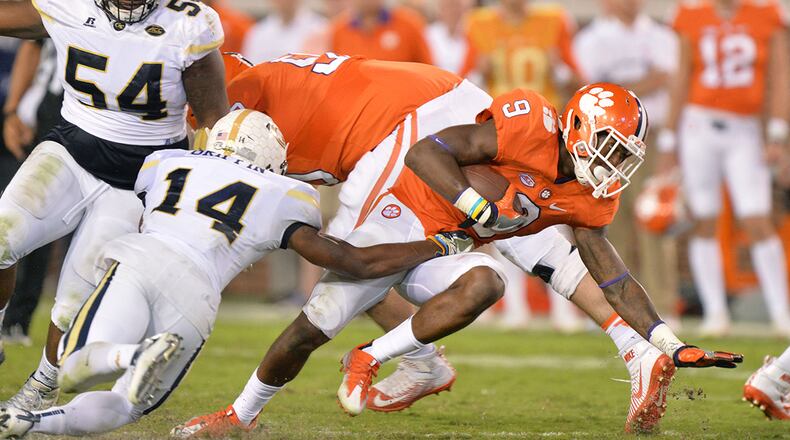With Clemson pinned deep in its end, Georgia Tech safety Corey Griffin knifed into the box before the 1st-and-10 snap, tripping up Tigers running back Wayne Gallman for no gain.
On second down, linebacker Brant Mitchell squared up with Gallman in a hole, bringing down the All-ACC back from Grayson High for a 2-yard gain. On 3rd-and-8, defensive tackle Patrick Gamble pressured Tigers quarterback Deshaun Watson on the front end and cornerback Lamont Simmons batted away the deep ball at the back end.
There wasn’t enough of that sort of play in the Yellow Jackets’ 26-7 loss to No. 5 Clemson last Thursday. But this three-and-out early in the second quarter represented Tech’s defense at its best, its run stopping in particular.
“I’m pleased with the direction we’re moving in, but certainly not satisfied,” defensive coordinator Ted Roof said. “We’ve got a long way to go.”
Last season, Tech gave up 4.69 yards per carry, tied for 91st nationally. Through four games, the rate has improved to 3.75 yards per carry, which is better, but an underwhelming 53rd.
Further, the average includes offensively feeble Boston College and FCS Mercer.
Still, Tech held Vanderbilt running back Ralph Webb to 69 yards on 18 carries and then limited Gallman to 59 yards on 17 carries. Since the start of last season, the only teams to hold him to a lower yards-per-carry average were two of the best defenses in the country in 2015, Boston College and Alabama.
In 2015, Gallman hammered the Jackets for 115 yards on 13 carries, including a 66-yard sideline gallop, the longest run of his career.
Tech has another truth-finding encounter Saturday against No. 14 Miami.
In the Hurricanes’ first three games, running back Mark Walton has ripped apart inferior competition, running 48 times for 401 yards. A brutal combination of power, speed and shiftiness, Walton gouged the Jackets last year, turning a screen pass into a 25-yard touchdown reception by eluding five tackle attempts on his way to the end zone.
Keeping plays in front of them has been a part of the improvement. Through four games and 129 rush attempts, Tech has given up one run play of 20 or more yards (a 73-yarder against Boston College). A year ago, the Jackets surrendered a 20-yard run once every 26.4 carries.
Tech’s pass defense, front and back, needs work and will undergo a major fitness test from Hurricanes quarterback Brad Kaaya, who last year needed just 25 attempts to amass 300 yards in Miami’s 38-21 win.
But Tech’s efforts against the pass will be abetted considerably if the Jackets can consistently put Kaaya in 3rd-and-long situations.
Roof said the improvement against the run is due to more gang tackling and getting in better position to make tackles.
“We’ve got to keep working on the perimeter runs, but we’re doing a better job inside, I think,” Roof said. “We’ve just got to keep grinding it out.”
The Jackets are doing this despite losing their best run stopper in 2015, defensive tackle Adam Gotsis, to the NFL. In his stead, Gamble has proven himself a capable anchor, doing the grunt work that leads to his teammates making tackles.
“I think he plays tough,” coach Paul Johnson said. “He cancels gaps, he hangs in there, he eats double teams.”
Tech also has a deeper rotation on the line, keeping players fresh at the point of attack. Defensive line coach Mike Pelton has been using Francis Kallon, Kyle Cerge-Henderson and Brentavious Glanton in a rotation with Gamble.
“Pass (rush) is a little more technique, but stopping the run is just being physically tough to fight and push and get off blocks and run and chase and all those things,” Pelton said. “We go into a game to try to stop the run and I think our guys try to take pride in it.”
About the Author
Keep Reading
The Latest
Featured


